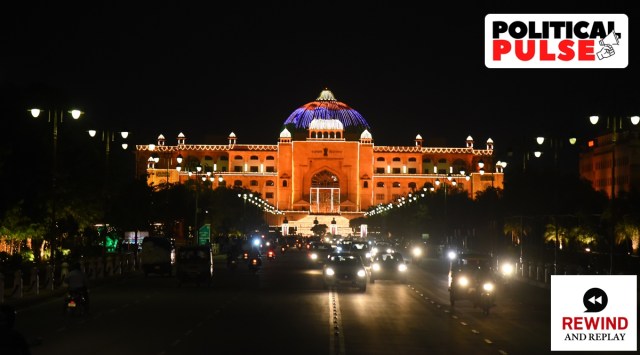Rewind & Replay | Of horses and (un)stable politics: A Rajasthan story that dates back to 1967
With RS polls round the corner, the Congress and BJP have moved their MLAs to resorts to check horse-trading. But the state has seen this before – as early as 1967.
 The last two Rajya Sabha polls also saw the same pattern: sequestered MLAs, followed by horse-trading allegations. However, sequestering MLAs is not a new feature in Rajasthan. (Express archive)
The last two Rajya Sabha polls also saw the same pattern: sequestered MLAs, followed by horse-trading allegations. However, sequestering MLAs is not a new feature in Rajasthan. (Express archive)The Rajasthan government’s chief whip Mahesh Joshi submitted a written complaint Tuesday to the Chief Election Commissioner against possible horse-trading attempts in the state, despite the Congress’s and the BJP’s MLAs being moved to resorts in Udaipur and Jaipur respectively, ahead of the Rajya Sabha polls on June 10.
The last two Rajya Sabha polls also saw the same pattern: sequestered MLAs, followed by horse-trading allegations. However, sequestering MLAs is not a new feature in Rajasthan.
In 1967, the Congress in the state could not reach the halfway mark with its 89 seats in the Assembly of 184 seats. The party’s tally further got reduced to 88 seats, after MLA Damodar Lal Vyas, who had won both the Tonk and Malpura seats, resigned from one.
The non-Congress parties then came together – the Swatantra Party (SWA) with 48 seats, the Bharatiya Jan Sangh (BJS) with 22, the Sanghata Socialist Party (SSP) with eight seats, the Communist Party of India with one, along with most Independents – and staked claim to form the government. The Governor, however, invited the Congress’ Mohanlal Sukhadia instead as the leader of the single largest party.
This led to protests, including the infamous shootout in Jaipur on March 7 that year where nine people died in police firing. President’s rule was also imposed in the state for the first time on March 13. However, the Congress used the time to sequester its MLAs and indulged in horse trading, even managing the numbers to form the government.
That was the first known instance of sequestering or baadebandi in a state known for its largely bipolar politics that made it key for parties to keep their flock together.
But it wasn’t until 1990 that the state saw another episode of horse-trading or open switching of sides of MLAs. That year, the Janata Dal’s 55 MLAs decided to withdraw support to the Bhairon Singh Shekhawat-led BJP government in the state, following the violent protests in Rajasthan post the arrest of then BJP president LK Advani. The BJP had 85 MLAs of its own, 16 short of a simple majority.
Shekhawat allegedly engineered a division of the Janata Dal and a breakaway unit of 25 MLAs led by ex-Rajya Sabha member Digvijay Singh went on to support Shekhawat.
Political analyst Ashafaque Kayamkhani says, “Except for 1967, there was no baadebandi (sequestering) before 1990 as the elections were usually one sided,” adding that the economic reforms in 1991 paved way for economic growth, with “money trickling down to panchayat elections, and municipality polls”.
Explaining this trend, Kayamkhani says, “Earlier, other parties were not as financially strong as the Congress and this changed in 2014, when the BJP numbers grew and they came to power at the Centre.”
Ahead of the 2016 Rajya Sabha polls, BJP had taken its MLAs to a hotel on the outskirts of Jaipur on the pretext of “training”.
In 2020, before the Rajya Sabha polls, the Congress had similarly moved its MLAs to resorts after alleging that there were plans by the BJP to bribe the MLAs into cross-voting for its candidates.
What is, however, new is the aggressive nature of sequestering the MLAs during polls, with reports emerging that candidates are being told to keep their phones switched off.
“People have lost their trust in democracy and that’s why the sequestering of MLAs and other public representatives is quite common now,” Kayamkhani says.
- 01
- 02
- 03
- 04
- 05































